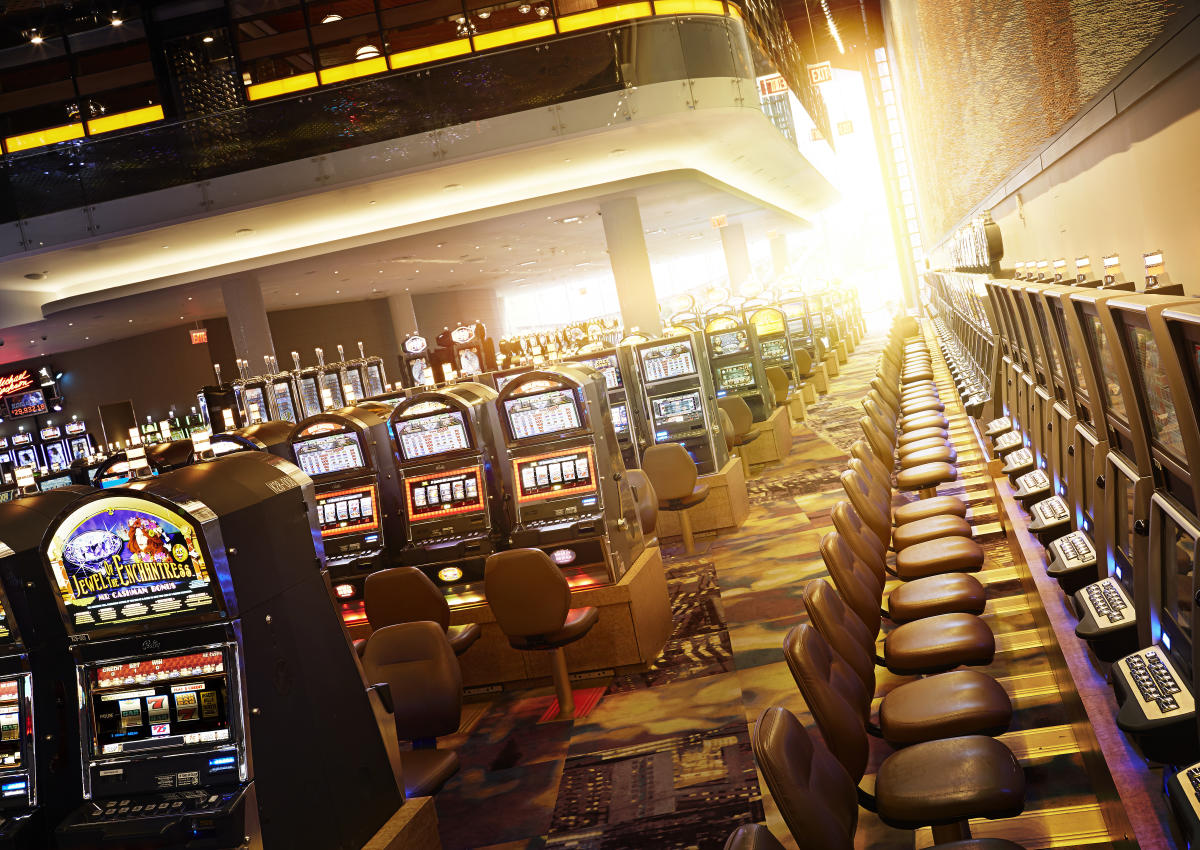SPECIAL REPORT: The Great Yonkers Casino Gamble
News Based on facts, either observed and verified directly by the reporter, or reported and verified from knowledgeable sources.
Has betting on Empire City paid off? (PART 2 of 2)

Good morning! Today is Tuesday, April 26, and you are reading today’s section of Examiner+, a digital newsmagazine serving Westchester, Putnam, and the surrounding Hudson Valley.
Last week, in part one of our Special Report, we looked at the genesis of Empire City, its evolution and growing popularity, and its quest to become a fully licensed casino with live dealers. Here, in part two, we take a candid look at some of the economic wins and social losses incurred by Yonkers and greater Westchester from its big bet on Empire City.
Need to subscribe — or upgrade your Examiner+ subscription to enjoy full access to all of our premium digital content? Take advantage of our special FREE TRIAL OFFER.
Take Examiner+ on a test drive today at NO CHARGE for a full month. Enjoy full membership-level access to all of our premium local content, delivered straight to your inbox six times a week.

In New York, 18 to 24-year-olds currently have the highest percentage of problem gamblers at 24.8 percent. But for individuals recovering from a gambling addiction, the damage casinos like Empire City can create is dangerous enough — even without a full-fledged gaming license.
“It got me hooked.”
Ann, a Westchester resident who requested to go by her middle name to protect her identity, was never a gambler until she retired at 55.
The first time she went into Empire City, it was with her daughter, who had recently turned 21. She says going to the casino seemed like innocent fun at the time.
A month or two after her first visit, Ann went back. Then a few weeks later, she went back again.
“The more you play there, the more free plays you get [sent] in the mail,” Ann says. “So every time I got those, I thought, ‘I’ll play with their money so I can lose their $10.’”
But then it became Ann’s $10. Ann’s $20. Ann’s $50.
Initially going to the casino for an hour or two, Ann’s visits soon increased to five to six hours. Then they became all-consuming.
“I went from an hour or two to fourteen hours a day,” Ann recounts. “So from the time I got up until 10 or 11 at night.”
While at the casino, Ann would skip meals and never take restroom breaks. She wouldn’t answer her phone or have an awareness of her surroundings, narrowly focused on the machines.
Once a police officer came to ask her about a woman who had been sitting next to her machine for over an hour, and security had been watching on the camera.
“I had no idea [she was there],” Ann says.
As a creative and artistic person, Ann was drawn to the video lottery terminals (VLTs), which feature bright colors, fast-moving images, and sounds.
On VLTs, gamblers may bet 10 or more games per minute, offering an unparalleled speed of play and quickness of reward. Such a fast pace increases the addictive properties of VLT play and feeds the hypnotic, trance-like state gambling can create, worrying those who study addiction.

“I don’t know if it was the lights, the sounds, the music, or the loss of time,” Ann says, noting that there are no clocks in the casino. “It got me hooked.”
When it comes to casino design, layout, and deals, everything is deliberate. And it often plays on the weaknesses of human psychology.
“It transferred from not wanting to break away from the machine to not being able to,” Ann says.
During this time, Ann said she was not like herself. She began isolating herself from friends and family, avoided any social interaction, and gave up all of her interests and hobbies.
Having always been the strong one in her family, someone people depended on, the guilt and shame began to eat away at Ann.
“When you’re trying to hide your secrets, it takes its toll physically, emotionally, and mentally,” Ann says. “I couldn’t concentrate. I couldn’t hold a conversation. I couldn’t remember what people said to me.”
Looking at photographs or videos from that period, Ann says she does not look, sound, or act the same.
In 2018, Ann went to a Gamblers Anonymous (GA) meeting for the first time, roughly five years after her life became overcome by gambling.
White knuckling it initially, she says she thought about going to the casino from the moment she woke up in the morning.
“The whole day, I would be sitting staring out the window going, ‘Is it 7 p.m. yet? Is it 7 p.m. yet?’” Ann says. “The only thing that kept me going was the promise of the meeting that night.”
During this time, Ann could not drive on the Thruway because she’d pass the casino.
“One of the [GA] guidelines is don’t test or tempt yourself,” Ann says. “If I had to go to Yonkers, and I’m from Yonkers originally and had to visit family there, I would take the back roads.”
Now three and a half years into her recovery, Ann says she has regained everything she lost to gambling and more. Without staying connected to GA’s guidelines and its support network, she says it wouldn’t be possible.
“I’m doing my projects, creating things again,” Ann says. “It feels wonderful to not have to be a prisoner to the gambling.”
While Ann doesn’t blame Empire City or believe the casino should be shut down altogether, she thinks the proximity to the casino — in tandem with her recent retirement and discretionary funds — helped feed the addiction.
Most experts, with the exception of the National Center for Responsible Gambling (which is funded by the casino industry), agree that having a casino in a community increases gambling addiction rates in that area.
A large-scale study in 2004 found that those living within 10 miles of a casino have twice the rate of problem gambling as those who lived farther from a casino. More than half the population in the Northeast now lives within 25 miles of a casino featuring VLTs, up from previous decades.
“There are people who can go and enjoy it for what it is,” Ann says. “I’m not one of those people.”

“You get hypnotized somehow.”
Mary, a 66-year-old Yonkers resident who lives blocks away from Empire City, first stepped foot in the casino with a friend and her friend’s husband.
With less than $100 in her pocket, Mary — who requested to be referred to only by her first name — played alongside the two and came home with a little money.
After going there once, she started to go back a few times, mainly with friends. Then she started going by herself.
“It just got me,” Mary says. “I went from going once or twice a month to going every Friday and Saturday night. Then I wound up going five days [a week].”
As a divorced single mother with teenage daughters at the time, the casino became a new place to hang out and have fun — until it no longer was.
“After a while, I got like a robot,” Mary says. “You get hypnotized.”
Twice, Mary went through an entire two-week paycheck in a couple of hours. Tax refund money earmarked for a summer vacation with her daughters was gone within a month.
Mary began borrowing money from other people, taking pay advances from work, and overdrawing her bank account.
Bills started piling up. Rent was late. At times, she didn’t have enough money to buy food.
“I was just scrambling all the time to make ends meet,” Mary says. “It was just a horrible way to live.”
Sober for over 30 years, Mary knew if she kept gambling, she would end up going back to drinking.
“Because now I’m starting not to like myself,” Mary recalls.
At its worst, Mary contemplated suicide because she just couldn’t stop gambling.
“Things were getting bad, and I didn’t see a way out,” Mary says. “That’s what made me realize I had a problem.”
Mary started going to GA in 2011. In July, she’ll be celebrating five years in recovery.
Although it was incredibly difficult at first, Mary says continuing to go to the meetings and letting others in the fellowship offer their support helped her stay away from the casino.
“The best thing is I don’t want to gamble anymore,” Mary says. “I’m not up at night worried. I can pay my bills and be there for my kids.”
Mary says now she can be depended on again and, overall, she’s happier and healthier. She’s no longer on edge constantly.
“I can go home and relax, read a book, or watch a movie,” Mary says. “I’m not wanting to go over there or trying to figure out how to get money or pay someone back.”
Mary says having Empire City in her backyard definitely made it difficult to stay away.
“It made it easier for me to keep gambling because it was so close,” Mary says. “I would go over there knowing I would lose money, and I would still go.”
Mary says gambling addiction is a sneaky thing, especially for more affluent gamblers who can more easily hide their financial hardships.
According to OASAS, the higher a gambler’s income, the less likely they are to be classified as a problem gambler, evidenced by statistics on annual household income.
The percentage of problem gamblers among the poorest gamblers (making less than $30,000 a year) is 24.1, compared to 11.2 percent for the highest-income earners making $75,000 or greater.
“I’m not a big income earner to begin with, so I’d feel it more, but people can hide it for a long time,” Mary says.
“It’s a hard thing to admit you can’t control,” Mary adds. “You’re always thinking, ‘I’m going to win my money back.’”
Mary knows there’s a whole psychology behind keeping people inside the casino spending their money. And for a long time, it worked on her.
“How they set the place up, you can’t find the exits. There are no clocks,” Mary says, noting that promotions and comps the casino sends in the mail only entice you more. “People get easily hooked.”
Between her time in GA and many hours spent at the casino, Mary has heard many stories of retirees blowing through their entire monthly checks or people who have become homeless because of their gambling.
With all the hours and days spent at Empire City, Ann says there were always many senior gamblers.
“They choose to go there and spend their money, but when does it stop becoming a choice for them?” Ann asks. “The elderly have a lot of time on their hands.”
At GA meetings, she sees elderly people well into their 80s and 90s.
“You’d never think gambling is such as awful thing as it is and how much it devastates,” Mary says. “But you get hypnotized somehow.”

Dedicated dollars for education
All public schools throughout the state receive money from the New York State Lottery education fund, which disperses dollars brought in from gambling to districts.
In Yonkers, the district receives money from the state lottery aid, as well as an annual $19.6 million payment in lieu of taxes from VLT proceeds at Empire City — the only district in the state to receive this kind of payment.
As of 2018, Yonkers received an estimated $1,455.68 in lottery education aid per student, much less compared to the other three other Big Five school districts.
Superintendent of Schools Dr. Edwin Quezada says funds from the casino provide consistent recurring dollars critically needed to support the bottom line for the district’s instructional programs.
“As a dependent school district, our revenue comes primarily from New York State and the City of Yonkers,” Dr. Quezada says. “In fact, we have been lobbying the State to increase this funding to $25 million beginning next year.”
When VLTs were legalized in 2001, the state required casinos to send at least 60 percent of the machines’ total revenue to the state education fund.
However, a 2015 Buzzfeed News investigation found that New York schools get just 45 percent of VLT earnings. At the time of the investigation, as well as in Empire City’s latest fiscal year reporting, the casino only contributed 50 percent of its total VLT earnings.
“The casino’s revenue exponentially increases every year, and this funding source has not changed for 13 years,” Dr. Quezada continues. “Our children’s needs drive the district’s expenditures, and these costs continue to grow. Now is the time, in fact, it is a moral imperative, to increase this source of education funding for Yonkers children.”
“Nothing but a success”
When asked if there are any notable downsides to having the casino within Yonkers city limits, Mayor Mike Spano says there aren’t any, in his opinion. The city doesn’t have a homeless population or crime issue outside of the casino — two frequent concerns connected to casinos.
Lieutenant Dean Politopoulos, Public Information Officer at the City of Yonkers Police Department, says, generally speaking, they have not seen an increase in crime in the area surrounding the casino.
He says that when the casino first opened, there were some traffic issues, which ultimately got sorted out, and a slight bump in disputes — ranging from a fender bender in the parking lot or people getting in a fight in the casino. But, for the most part, it’s self-contained, and security at Empire City handles any scuffles that arise.
“Occasionally, we will get a fight or an assault from that location, but it really wouldn’t be much different than any other bar or restaurant where alcohol is served, and people might get rowdy,” Lieutenant Politopoulos adds. “So it doesn’t stand out as a red zone district or anything like that.”
According to the mayor’s office, an estimated nine million people come to Empire City each year. Because the casino is a destination and entertainment location, Spano says the casino impacts the surrounding area more than a shopping mall would, for example. “What Yonkers has is something really good and positive, and the people are coming,” Mayor Spano says.
When people visit, they will obviously gamble, but Mayor Spano says they will also patron businesses nearby, such as restaurants and hotels. As a result, he says the neighborhoods surrounding the casino are doing well, as are the casino’s employees and residents who live nearby.
While some may worry about people spending their last paychecks at the casino, he says that’s not the case at Empire City. Problem gamblers’ own stories, of course, can paint a different picture. “We have not had a bad experience,” Mayor Spano says. “It’s been nothing but a huge success for us.”
But for advocates like Les Bernal, National Director of Stop Predatory Gambling, the economic success of casinos like Empire City comes at a hefty price: the material hardship a community’s residents can face if they develop a gambling problem.
“What separates Empire City Casino from every other business in the Yonkers area, including those involving vices like alcohol and tobacco, is they are profiting from a form of financial fraud, similar to price-gouging and false advertising, that results in life-changing financial losses for thousands of local citizens,” Bernal says.
“This financial exchange is mathematically rigged against you, so inevitably you lose your money in the end, especially if you keep gambling,” he adds. “Any success comes at someone else’s expense.”
Sourcing & Methodology Statement:
This story sought to look at the successes and challenges connected to Empire City in the years since the casino has been operating, as well as the current push for a full-scale gaming license, which would allow live table games and dealers in addition to the current video lottery terminals. In order to present a well-rounded, nuanced, and diverse story, I spoke to stakeholders on both sides of the issue in Yonkers, including elected officials, safety personnel, labor leaders, business councils, school officials, anti-gambling advocates, and individuals overcoming addiction. Due to the ongoing COVID-19 pandemic, interviews were conducted on the phone and via Zoom. Individuals overcoming addiction were named by first or middle name only to protect their anonymity due to the sensitive subject matter discussed.
References:
“Casino Design: The Sneaky Tricks That Make You Spend More”, Casino, July 21, 2020, https://www.casino.org/blog/casino-design-psychology/
“The Relationship Between the Number of Types of Legal Gambling and the Rates of Gambling Behaviors and Problems Across U.S. States”, Journal of Gambling Studies, June 2016, https://www.ncbi.nlm.nih.gov/pmc/articles/PMC4671822/
“The Crowded Market for Casino Gambling” New York Times, August 11, 2014, https://www.nytimes.com/interactive/2014/08/11/us/crowded-market-for-casino-gambling.html
“How do casinos affect Yonkers school funding?”, Lohud, May 29, 2018, https://www.lohud.com/story/news/education/2018/05/29/how-do-casinos-affect-yonkers-schools-funding/651940002/
“Casinos Keep New York School Money”, BuzzFeed News, September 28, 2015, https://www.buzzfeednews.com/article/kevintownsend/lottery-slot-machines-shortchange-ny-schools
“Empire City Casino at Yonkers Raceway”, Empire City Casino by MGM Resorts, Fiscal Year 2022-2023, https://www.gaming.ny.gov/pdf/finance/Web%20Site%20Report%20-%20Empire%20City%20Casino%20at%20Yonkers%20Raceway.pdf
Bailey Hosfelt is a full-time reporter at Examiner Media, with a special interest in LGBTQ+ issues and the environment. Originally from Connecticut and raised in West Virginia, the maternal side of their family has roots in Rye. Prior to Examiner, Bailey contributed to City Limits, where they wrote about healthcare and climate change. Bailey graduated from Fordham University with a bachelor’s in journalism and currently resides in Brooklyn with their girlfriend and two cats, Lieutenant Governor and Hilma. When they’re not reporting, Bailey can be found picking up free books off the street, shooting film photography, and scouring neighborhood thrift stores for the next best find. You can follow Bailey on Twitter at @baileyhosfelt.
We hope you’ve enjoyed today’s section of Examiner+. What did you think? We love honest feedback. Tell us: examinerplus@theexaminernews.com
For hyperlocal news coverage of Westchester and Putnam from our four community newspapers, visit our sister site, www.theexaminernews.com

Examiner Media – Keeping you informed with professionally-reported local news, features, and sports coverage.
